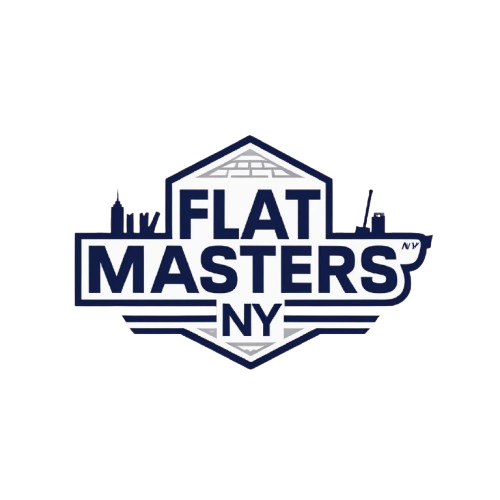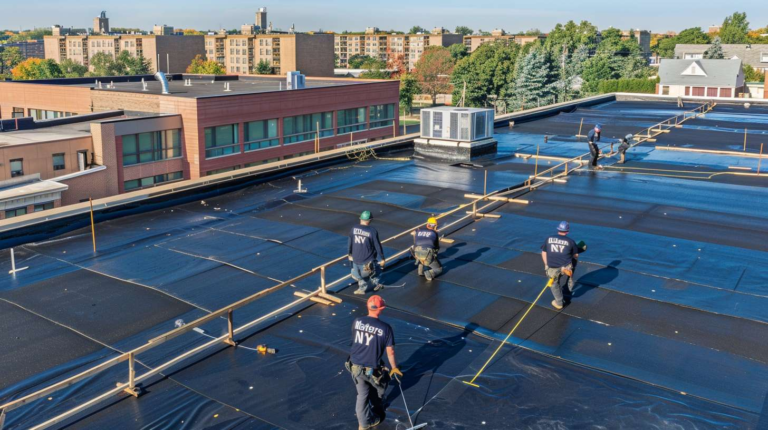Converting Flat Roof to Sloped Roof: 5 Key Factors to Consider
Let me be straight with you - converting flat roof to sloped roof isn't just about throwing some trusses up there and calling it a day. After two decades of roofing in Queens, I've seen enough botched conversion jobs to know that this is serious structural work that'll run you anywhere from $15,000 to $45,000 depending on your home's size and complexity.
Last month, we had a homeowner on Astoria Boulevard who thought he could DIY this project after watching some YouTube videos. Three weeks later, he's calling Flat Masters NY because his "simple conversion" turned into a structural nightmare with water damage spreading through his second floor. Look, I get it - flat roofs in Queens take a beating from nor'easters and that pooling water situation, but complete roof conversion projects require serious planning.
Factor 1: Structural Engineering Assessment
Here's the thing nobody tells you upfront - your existing structure probably wasn't designed to handle a sloped roof's load distribution. When you're figuring out how to change a flat roof to a sloped roof, the first call isn't to a roofer, it's to a structural engineer.
We work with three licensed engineers here in Queens, and every single conversion project starts with their stamp of approval. The cost? Usually runs $800-$1,500 for the assessment, but trust me, it's cheaper than rebuilding your house after a collapse. Your engineer needs to evaluate:
- Existing load-bearing capacity of walls and foundations
- Required modifications to support new roof structure
- Building code compliance for the new pitch angle
- Integration points between old and new structural elements
In Astoria and Long Island City, we're dealing with a lot of post-war construction that used different building standards. Some of these homes can handle the conversion with minimal reinforcement, others need significant structural upgrades.
Factor 2: Roof Pitch and Design Considerations
When people ask me how to replace a flat roof with a sloped roof, the first question I ask back is "what pitch are you thinking?" Because here in Queens, we've got specific challenges that affect this decision.
The salt air from Flushing Bay and the East River, combined with our winter freeze-thaw cycles, means you need at least a 4/12 pitch for proper drainage and snow shedding. But here's where it gets tricky - your neighborhood's zoning restrictions might limit how high you can build.
I remember a project on 31st Street where the homeowner wanted a steep 8/12 pitch for that classic colonial look, but the height restrictions meant we had to redesign three times before the city would approve it. We ended up with a 6/12 pitch that looked great and met code, but those redesign fees added $2,200 to the project.
Your design options when you replace flat roof with sloped roof include:
- Gable roof - most cost-effective, runs $18-28 per square foot
- Hip roof - more complex framing, expect $22-35 per square foot
- Shed roof - simple single slope, usually $15-24 per square foot
- Mansard or gambrel - premium options, $30-50+ per square foot
Factor 3: Building Permits and Code Compliance
Oh, and another thing about working in Queens - the Department of Buildings doesn't mess around with structural modifications. When you convert flat roof to sloped, you're looking at major alteration permits, not just a simple repair permit.
The permit process typically takes 4-8 weeks and costs between $1,200-3,500 depending on your project scope. But here's what really matters - any contractor who tells you they can skip permits on a conversion job is lying to you and setting you up for massive problems down the road.
Code requirements we deal with regularly include:
- Minimum ceiling height maintenance (usually 7'6" in living areas)
- Proper ventilation ratios for the new attic space
- Updated electrical work if existing systems are affected
- Fire safety compliance, especially egress requirements
- Energy code compliance for new insulation and air sealing
Last year, we had a conversion project in Elmhurst where the homeowner's existing electrical panel was mounted on the flat roof structure. The conversion meant relocating that panel, upgrading to 200-amp service, and running new circuits - adding $4,800 to what they thought would be a straightforward roofing job.
Factor 4: Weather Protection During Construction
Look, I don't care what other contractors say about working through Queens weather - how to make a flat roof into a sloped roof is not a project you rush because of a few rainy days.
The construction timeline typically runs 2-4 weeks depending on complexity, and during that time, your home is vulnerable. We always build temporary weather protection into our conversion projects, which adds roughly $2,500-4,000 to the total cost but prevents the kind of water damage that could cost you ten times that amount.
Here's our standard protection protocol:
- Temporary roof decking installation on day one
- Waterproof tarping systems rated for 60+ mph winds
- Interior protection for furnishings and electronics
- Daily weather monitoring with work stoppage protocols
Two summers ago, we were three days into a conversion in Flushing when Hurricane Henri decided to make an unscheduled visit. Because we'd properly protected the structure, the homeowner had zero interior damage while their neighbor (using a different contractor) spent $15,000 on water damage restoration.
Factor 5: Long-Term Maintenance and Performance
So what's really the best approach when you change flat roof to sloped? Think beyond the initial installation to how this roof will perform over the next 20-30 years.
Sloped roofs definitely handle our Queens weather better than flat systems - better snow shedding, superior drainage, easier maintenance access. But they also introduce new maintenance requirements like gutter cleaning, flashing inspections, and periodic shingle replacement.
Your material choices significantly impact long-term costs:
- Asphalt shingles - lowest upfront cost, 15-20 year lifespan, moderate maintenance
- Metal roofing - higher initial investment, 40-50 year performance, minimal maintenance
- Slate or tile - premium pricing, 50+ year lifespan, specialized maintenance needs
Here's something most contractors won't tell you - the transition areas where your new sloped roof meets existing walls or structures are your highest-risk points for future problems. At Flat Masters NY, we use a combination of step flashing, ice and water shield, and custom-fabricated transition pieces to eliminate these vulnerable areas.
We also recommend installing snow guards in certain situations. The added weight and sliding action of snow on a sloped roof can damage gutters, landscaping, and create safety hazards that weren't issues with your flat roof.
I can't tell you how many times I've gotten calls from homeowners six months after a conversion asking why their heating bills went up. The answer is usually poor insulation planning during the conversion process. When you create that new attic space, you need to maintain proper thermal boundaries and ventilation - something that requires careful coordination between roofing, insulation, and HVAC work.
My foreman Carlos always says the best conversion projects are the ones where you can't tell the house wasn't originally built with a sloped roof. That level of integration takes experience, proper planning, and honestly, it takes working with contractors who've done this specific work in Queens long enough to understand all the variables.
If you're serious about converting your flat roof, give us a call at (917) 994-7618. We'll walk your property, assess the structural requirements, and give you a realistic timeline and budget for the work. After 20+ years of roofing in Queens, we've seen every type of conversion challenge this area can throw at a project, and we know how to handle them right the first time.


